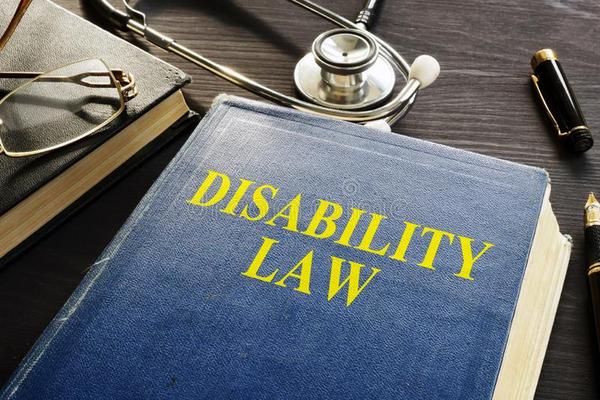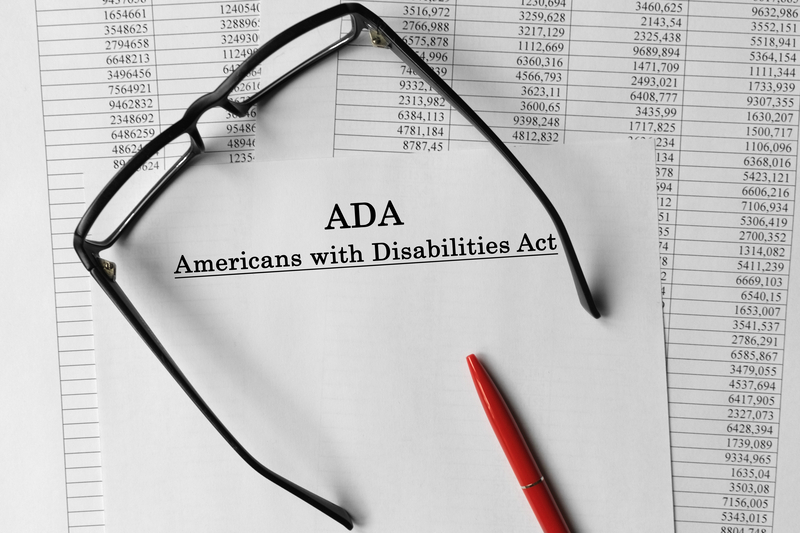
Disability law refers to laws related to people with disabilities; mostly, these laws protect handicapped people from particular sorts of discrimination, especially regarding employment, housing, education, and accessibility to general services. Now, handicap law is mostly governed by the Americans with Disabilities Act (ADA) of 1990.
The ADA is headquartered in Title 42, Sections 12101-12213 of this U.S. Code.
In, 42 U.S. Code § 12102, the ADA defines a disability as any of the following three classes:
"a physical or mental impairment that substantially limits at least one of the significant life activities of the person";
"a record of such disability"; or even
"being regarded as having such an impairment"
The ADA further requires that reasonable accommodations be created to provide people with disabilities equal opportunities. Agencies and departments charged with enforcement of the ADA contain the Equal Employment Opportunity Commission (EEOC) along with also the Department of Justice.
Back in Sutton v. United Air Lines, 527 U.S. 471 (1999) that the Supreme Court held an individual isn't considered"handicapped" under the first class in the event the person's impairment may be mitigated with drugs or a gadget.
The expression"substantially limits" has resulted in litigation to find out the reach of the phrase.
Emotional Disabilities
Other statutes prohibiting discrimination against people with disabilities comprise the Fair Housing Act, the Rehabilitation Act of 1973, the Air Carrier Access Act, along with the People with Disabilities Education Act.
Under the Fair Housing Act, it's illegal to discriminate in any aspect of selling, leasing, or denying home due to someone's handicap. Owners are further required to create reasonable exceptions in their home policies to yield equal housing opportunities to people with disabilities. Like the ADA, the Fair Housing Act has 3 ways of somebody to be described as having a disability:
People with a physical or mental impairment that substantially limits one or more major life activities; people That Are regarded as having such an impairment people having a list of such an impairment
The Fair Housing Act prohibits people from needing to make"reasonable accommodations" to principles, policies, practices, or services, when such accommodations may be necessary to afford individuals with disabilities an equal opportunity to utilize and enjoy a house. A"reasonable accommodation" is a change, exception, or modification to a rule, policy, practice, or support which could be crucial for an individual with a disability to have an equal opportunity to utilize and enjoy a dwelling, including public and common use spaces.
The Rehabilitation Act prohibits discrimination on the grounds of handicap in programs conducted by federal agencies, in programs receiving federal financial assistance, in federal employment, and the employment practices of federal contractors. Its criteria mirror those of the ADA.
Under the Air Carrier Access Act, air carriers are prohibited from discrimination against qualified people with physical and/or psychological impairments.

People with Disabilities Education Act
At length, the Individuals with Disabilities Education Act requires public schools to make available to all eligible children with disabilities a free appropriate public schooling at a minimum restrictive environment depending on their requirements.
The ADA prohibits discrimination on the grounds of disability in employment, State and local authorities, public accommodations, commercial facilities, transportation, and telecommunications. Additionally, it applies to the United States Congress.
Someone with a disability is defined by the ADA as an individual that has a physical or mental impairment that substantially limits one or more major life activities, someone that has a history or record of such an impairment, or a person who's perceived by others as having such an impairment. The ADA doesn't specifically name all the impairments that are covered.
To be protected by the ADA, an individual must have a disability or have a relationship or association with an individual with a handicap.
Title I requires employers with 15 or more employees to provide qualified individuals with disabilities an equal chance to benefit from the entire assortment of employment-related chances available to other people. By way of example, it prohibits discrimination in recruitment, hiring, promotions, training, pay, social activities, and other privileges of employment. It restricts questions which may be asked about an applicant's disability before a job offer is made, and it requires that employers make reasonable accommodation to the known physical or mental limitations of otherwise qualified individuals with disabilities, unless it results in an undue hardship.
Title I complaints must be submitted together with the U. S. Equal Employment Opportunity Commission (EEOC) within 180 days of the date of discrimination, or 300 days if the charge is filed with a designated State or local fair employment practice agency.
Charges of employment discrimination on the grounds of disability may be submitted at any given U.S. Equal Employment Opportunity Commission field office. Area offices are located in 50 cities across the U.S. and are listed in most telephone directories under"U.S. Government."
ADA Title II: State and Local Government Actions
Title II covers all activities of State and local governments irrespective of the government entity's size or receipt of Federal funding. Title II requires that State and local governments give people with disabilities an equal chance to benefit from all their applications, services, and actions (e.g. public instruction, employment, transport, recreation, healthcare, social services, courts, voting, and town meetings).
State and local authorities have to follow specific architectural standards in the new construction and alteration of their buildings. They also must relocate programs or otherwise provide access to inaccessible older buildings, and communicate effectively with those who have hearing, vision, or speech disabilities. Public entities aren't required to take action that could lead to undue financial and administrative burdens. They must create reasonable modifications to policies, practices, and procedures where necessary to avoid discrimination unless they can prove that doing so would fundamentally change the character of the ceremony, program, or activity being provided.
In certain circumstances, cases may be referred to a mediation program sponsored by the Department. The Department may bring a lawsuit in which it has investigated a matter and has been not able to solve crimes.
Disability Rights Section
It's not required to file a complaint with the Department of Justice (DOJ) or another Federal agency, or to get a"right-to-sue" letter, before going to court.
Public transportation authorities may not discriminate against individuals with disabilities in the provision of the services. They need to comply with requirements for accessibility in newly purchased vehicles, make good faith efforts to purchase or lease accessible used buses, remanufacture buses in an accessible manner, and unless it would lead to an undue burden, provide paratransit where they run fixed-route rail or bus systems. Paratransit is a service where people that cannot use the regular transit system independently (because of physical or mental impairment) are picked up and dropped off at their destinations. Questions and complaints about public transportation Ought to Be directed to:
Title III covers businesses and nonprofit service providers that are public accommodations, privately operated entities offering certain kinds of classes and examinations, privately operated transportation, and business centers. Public accommodations are private entities that own, rent, lease or operate facilities such as restaurants, retail shops, hotels, movie theaters, private schools, convention centers, doctors' offices, homeless shelters, transportation depots, zoos, funeral homes, daycare facilities, and recreation facilities including sports stadiums and fitness clubs.
They also have to comply with specific requirements related to architectural standards for new and altered buildings; reasonable modifications to policies, practices, and processes; successful communication with individuals with hearing, vision, or speech disabilities; and other accessibility requirements. Additionally, public accommodations must remove barriers in existing buildings where it's not difficult to do so without much difficulty or expense, given the public accommodation's resources.
Courses and examinations related to professional, instructional, or trade-related programs, licensing, certifications, or credentialing must be provided in a location and manner accessible to individuals with disabilities, or alternative accessible arrangements must be provided.
Commercial facilities, like factories and warehouses, must comply with the ADA's architectural standards for new construction and alterations.
In certain circumstances, cases may be referred to a mediation program sponsored by the Department. The Department is authorized to bring a lawsuit in which there's a pattern or practice of discrimination in violation of title III, or where an act of discrimination raises an issue of general public importance. It's not required to file a complaint with the Department of Justice (or any Federal agency), or to obtain a"right-to-sue" letter, before going to court.
Title IV addresses telephone and television access for those who have speech and hearing disabilities. It requires common carriers (telephone companies) to establish interstate telecommunications relay services (TRS) 24 hours per day, 7 days per week. TRS enables callers with hearing and speech disabilities who use TTYs (also called TDDs), and callers who use voice telephones to communicate with one another via a third party communications assistant. The Federal Communications Commission (FCC) has established minimum standards for TRS services. Title IV also requires closed captioning of Federally funded public service announcements.
Telecommunications Act
Section 255 and Section 251(a)(2) of the Communications Act of 1934, as amended by the Telecommunications Act of 1996, require manufacturers of telecommunications equipment and providers of telecommunications providers to make sure that such equipment and services are accessible to and useable by individuals with disabilities, if readily achievable. These amendments ensure that people with disabilities will have access to a wide selection of goods and services including phones, mobile phones, pagers, call-waiting, and operator services, that are often inaccessible to a lot of users with disabilities.
Fair Housing Act
The Fair Housing Act, as amended in 1988, prohibits housing discrimination on the grounds of race, color, religion, gender, handicap, familial status, and national origin. Its coverage includes private housing, housing that receives Federal financial assistance, and State and local government housing. It's illegal to discriminate in any aspect of selling or renting housing or to deny a dwelling to a buyer or renter due to the disability of the individual, an individual related to the buyer or tenant, or an individual that plans to reside in the house. Other covered activities include, as an example, financing, zoning practices, new construction design, and promotion.
The Fair Housing Act requires owners of housing facilities to make reasonable exceptions in their policies and operations to afford people with disabilities equal housing opportunities. By way of instance, a landlord with a"no pets" policy may be asked to give an exception to the rule and permit an individual who's blind to keep a guide dog in the house. The Fair Housing Act also requires landlords to permit tenants with disabilities to make sensible access-related alterations to their living area, as well as to common use spaces. (The landlord isn't required to be responsible for changes.) The Act further requires that new multifamily housing with four or more units be designed and constructed to permit access for individuals with disabilities. This includes accessible common use areas, doors that are wide enough for wheelchairs, kitchens, and bathrooms that allow an individual using a wheelchair to maneuver, and other adaptable features within the units.
Complaints of Fair Housing Act violations may be filed together with the U.S. Department of Housing and Urban Development.
Air Carrier Access Act
The Air Carrier Access Act prohibits discrimination in air transportation by domestic and foreign air carriers against qualified individuals with physical or psychological impairments. It applies only to air carriers that provide regularly scheduled services for hire on the general public. Requirements address a broad selection of issues including boarding assistance and certain accessibility features in newly built aircraft and new or altered airport facilities. People may enforce rights under the Air Carrier Access Act by filing a complaint with the U.S. Department of Transportation, or by bringing a lawsuit in Federal court.
Voting Accessibility for the Elderly and Handicapped Act
Where no accessible location is available to function as a polling place, a political subdivision must offer an alternative way of casting a ballot on the day of the election. This legislation also requires states to make available registration and voting aids for handicapped and elderly voters, including information by TTYs or comparable apparatus.
The Voting Accessibility for the Elderly and Handicapped Act of 1984 generally requires polling places across the United States to be physically accessible to individuals with disabilities for federal elections.
National Voter Registration Act
The National Voter Registration Act of 1993, also referred to as the"Motor Voter Act," makes it much easier for all Americans to exercise their basic right to vote. One of the fundamental purposes of this Act is to increase the historically low registration rates of minorities and individuals with disabilities that have resulted from discrimination. The Motor Voter Act requires all offices of State-funded applications that are primarily engaged in providing services to individuals with disabilities to offer all program applicants with voter registration forms, to assist them in completing the forms, and to transmit completed forms to the proper State official.
